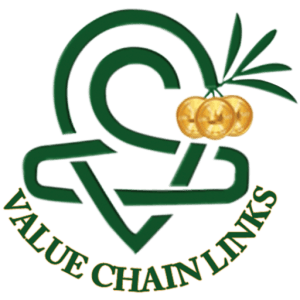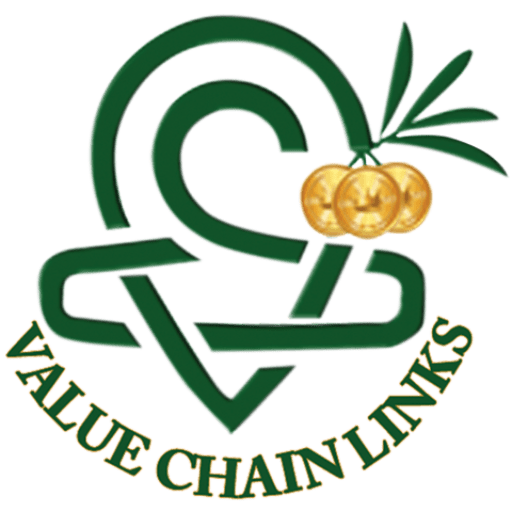WHY ARE BILLIONS OF $ AND DECADES OF INVESTMENTS IN AFRICA NOT BEARING THE “DESIRED FRUITS” AND THE SIMPLE ACTION THAT CAN CHANGE IT?
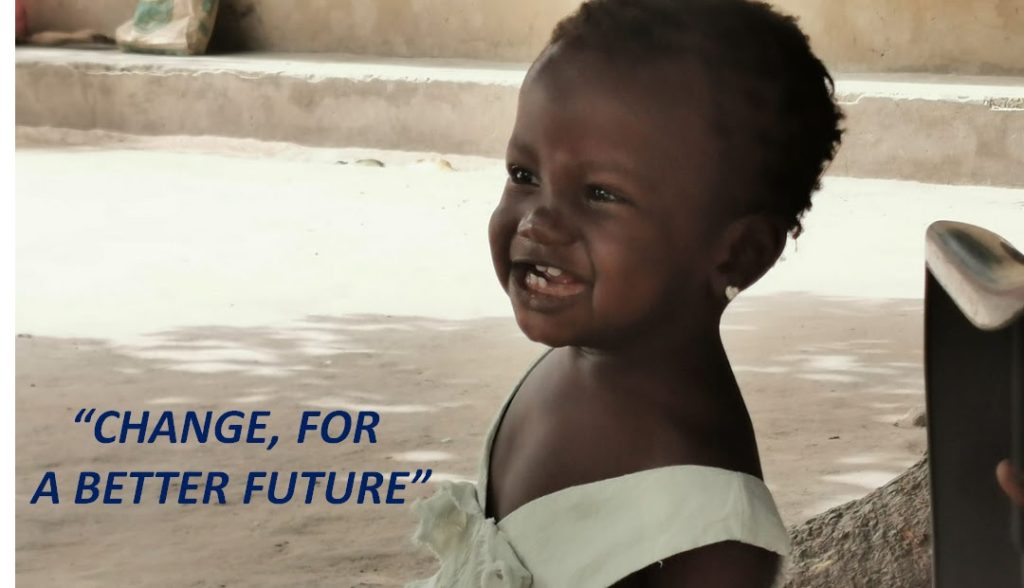
PART 2
BY DR. NIMROD
“Embrace empathy, and you already solved 90% of the problem.”
| Remark, the topic in this article is general and concerns all emerging economies. |
| You have made me so happy; following PART 1, I received many comments, some of which I share herein. I wish to thank those who shared their thoughts with me and looking forward to your feedback after PART 2. If you hadn’t had a chance to read Part 1 (link), I strongly suggest you read it first. PART 1 (OUTLINE)THE STAKEHOLDERS’ PERSPECTIVEIn this part, I reflected on my observations on the business / professional / political environment and reality within which the African farmer and his colleagues operate in emerging markets.Surprisingly, although decades and billions of $ investments in technologies and know-how transfer, the results are not apparent, and farmers’ economic state has improved by little, and in many cases, even worsen.The fact that thirty-six percent (36%) of the African population live in poverty (income <1.9 $/day), most of whom are active farmers, is a thunderous reminder that something is not working well.We discussed the four groups of stakeholders; Providers, Value-Chain, Governments, and Non-Profit Investors, and saw that their interests are not aligned with those of the growers. |
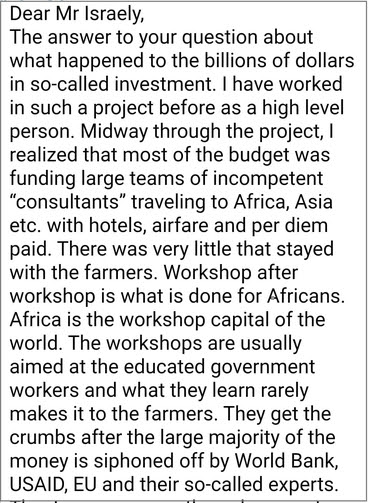
PART 2
THE FARMER’S PERSPECTIVE
I have met many African farmers, and I can tell you that they are as smart as you and me, even if they are less educated.
This farmer often has no electricity, no computer, no running water, no road to his village/house/mango orchard, no access to experts, no access to funds, no one to help in case of sickness, and no one but him to support his family.
The farmer is using most of his income to buy the basic food and essentials for his existence. After that, he is left with nothing to invest in his farm. Furthermore, based on his farm conditions, no one is ready to provide him a loan for his business.
To better understanding the farmer, let’s put on his “glasses” and see how he views and feel about each of the four professional groups presented in Part 1.
PROVIDERS – “They are selling me goods and services only against cash. When I have some money, they convince me to buy something. They get their money regardless if it helps me or not. (Saying with cynicism)Look at my house and my kitchen, and you will see how much it helped me. By the way, I get from them only support of how to apply the spray/product they sell me. They take no risk; I am the only one risking the results and still pay them.”
VALUE-CHAIN – “They come at the last moment to buy my fruits, after a year in which they invested nothing, helped nothing, and they risked nothing. Sometimes they pay a small advancement and at the harvest the rest. Sometimes they take the fruits and pay part of what we agreed, or even disappear, leaving me with nothing. Sometimes they come too late after the fruit flies already infested 50% to 80% of the produce. Sometimes they don’t come at all, and I am stuck with the fruits on the trees. They take no risk, while I am risking all my money, a year of work, and the income for the year to come.”
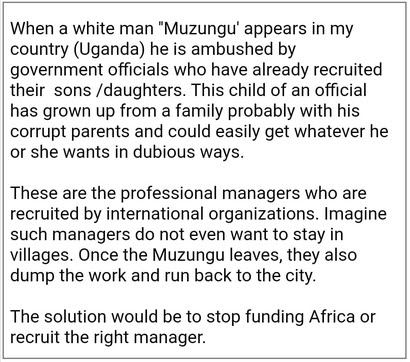
GOVERNMENTS – “They do nothing. I see them once in a blue moon, and then they are gone. Years ago, they gave us the mango trees and told us to plant them. I planted and since then received no support. They don’t care about us, they don’t come here, and they risk nothing, while I am risking everything by following their orders (e.g., planting those mango trees).”
NON-PROFIT INVESTORS – “God save me from all those that are coming here in their fancy cars, do something for a while, and then they are off on their way. So many projects, but look at my orchard how terrible it looks, with its low yield and quality. See the high fruit loss from fruit flies; nobody is ready to buy my fruits. Projects are coming and going, and we remain poor. They take no risk if they give the wrong advice, while I am taking all the risk.”
THE FARMER SHARES HIS THOUGHTS
“Dr. Nimrod, I will summarize it for you; I who have nothing is taking the risk for the advice, the goods I buy from the Providers, and all the “free help” of the various advisors.
I take all the risk when harvest time comes, and the Value-chain buyers will buy (for very little) only if they like my fruits. But what if they don’t like it?
I get no support from my Government, and when I get some help, it is part with no continuation. It is a risk to follow their minimal support, and it is a risk not to follow.
I take the risk with all the good intentions and good-hearted Non-profit investors coming here to say that they help poor African farmers. But in reality, they don’t help; none of them help. Today I have less than I had ten years ago!!
You see, it is
elementary; they all give advice that is true and good from their perspective and their point of view. But, none of them needs to face the reality I am facing. Let’s see them executing their advice with resources limited as mine. And most importantly- from my perspective – they are smug and arrogant in their advice because they do not carry the risk of applying their own advice.
Take, for example, irrigation. The Providers, the Government, and the Non-profit investors are telling us that we need irrigation. There is a river 2km away from which we can pump water or dig a well of 10m deep.
Of course, I don’t have the money to execute none of it. But even if you would give it to me for free or give me a loan, how would I finance the gasoline required for the pump? How would I even maintain and pay for the irrigation system maintenance?
You will not be surprised if I will tell you that based on experience, I trust no one!
But I am ready to trust and to do business together with anyone who will convince me through actions to trust him.”
How can “anyone” help you to trust them?
“Easy. Be with me, share my risks and success. If you trust your own words, stay behind those words, and I am sure we will have a lot of success when working together.”
How do you expect “sharing the risk”?
“Easy and straightforward. Invest with me and make sure your income is directly related to my income. When I earn more, you earn more; when I lose, you lose.
I am already invested in the land and giving most of the labor. I will trust anyone who will invest in my field with his goods, services, know-how, labor, and I will see that his income model is interconnected and dependent on my income. This is when I know that we share the risk, and hence we can trust each other.
If you want to understand and help me, then share the professional and business risk with me. Anyone who will do this will surely give me better advice than those of a bystander.”
I see you will trust someone more easily if that someone will (1) invest with you, for example, in goods, services, know-how, labor, etc., (2) shares the risks with you, and (3) his income and livelihood will be dependent and connected to your level of success or failure? “You said it exactly the way I wish it should be.”
Anything else that you would like to add?
“Yes. Now I wonder how many companies, experts, and advisors that told me “do irrigation system,” one that cost ten times more than my house, would come and invest in my farm in such a system. On my side, I promise to share my income with them”.
Oh, that reminds me, how in practice you think of “sharing the income”?
“Easy. With this new investor/partner, I am sure we will get (1) higher quality and (2) higher yield per hectare. Most importantly, we will (3) sell our produce to better markets for a better price with his abilities and relations. Hence, thanks to his contribution, we will surely increase the income per hectare.
I dream that he will keep part of the income to cover his investment/costs and profit, while I will get the rest. This is what I like, as long as my risk decreases and my profit increases.
I am looking to see a sign of positive economic change and business success. I want to progress every year, avoid uncertainty, have stability and predictability.
When I trust my partner, and he trusts me, I can sleep better at night. I can smile. I can be optimistic that my family’s future will be better than its present. Yes, this is what I would like to see.
Now the question is, will all those who speak highly of their goods, services, knowledge, etc., really trust what they say? Will they put their money where their mouth is? If so, will they be ready to invest with me and share my RISKS and PROFITS?”
PRACTICE EMPATHY
Farmer’s life history is different than ours. Still, we should behave with dignity, respect, and appreciation. We should invest more in learning and understanding farmers’ motivations, as reflected in their actions.
One way of doing it is spending much time together, listening, talking, looking, and improving our understanding.
When I improved my understanding of the mango growers, I notice that they are both: (a) the poorest in the value chain and (b) carry most of the risk (financial and professional). This is happening while the more robust links in the value chain keep themselves reserved and protected.
If you were a farmer, would you trust your partners based, knowing that you are the poorest, they are the richest, and yet you bear all/most of the risk?
“Trust” without actions is an empty word. Where are your actions?
How much you share the risk & success with the farmer?
| THE ROOT PROBLEMWe see that the problem of the farmer is business-oriented. Hence, it requires a more equitable distribution of risks. Non-business-oriented entities (including governments, the UN, World Bank, NGOs, philanthropists) will find it challenging to provide a business-oriented solution unless they choose to operate through business companies (highly recommended).Today, non-business-oriented entities are afraid to work through private companies while at the same time want to encourage and increase and promote business capacity among farmers. There is a mismatch between their aspirations and actions.If you are a company manager, how would you know if you meet the criteria for a successful partnership in the farmer’s eyes?Ask yourself the following question; can I stand up before the farmer and say to him wholeheartedly,”My company has invested in your business, this year, the same or more than you have invested. We will be successful if you will, and we will lose if you lose. Our destinies are intertwined! Now let’s work together for common success.” TO BE CONTINUED next week, PART 3, I will discuss a novel business model approach designed based on understanding the parties and stakeholders in the agro sector, with a clear goal to create prosperity for the farmers. |
| TAKEAWAYS» FARMERS know well what is good for them. We need to listen more carefully.» FARMERS are looking for someone who will share the overall RISK with them.» FARMERS are business people and appreciate those who genuinely wish to help.» FARMERS need and want results-oriented long-term business commitment, not charity. |
